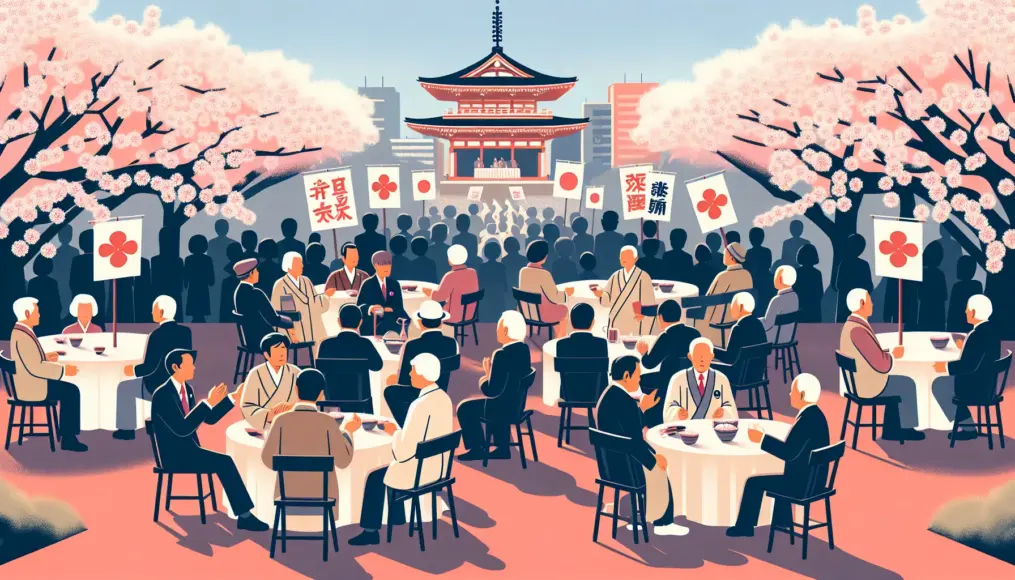The Cherry Blossom Viewing Event, or “Sakura wo Miru Kai,” stands out as a significant occasion in Japanese politics. However, beneath its picturesque surface lies a tangled web of issues. This event is far more than a simple celebration of cherry blossoms; it is intertwined with political interests and allegations of misconduct. In this article, we will delve into the historical context of the Cherry Blossom Viewing Event and explore the political ramifications it has stirred.
We will examine the connections between past political controversies and how the public has reacted, as well as consider the implications for contemporary Japanese politics. What lessons can we glean from this situation? Let’s take a closer look at the various challenges that lurk behind the Cherry Blossom Viewing Event.
- Historical Background and Its Connections to the Event
- Public Reactions and Political Consequences
- Politicians’ Actions and Future Challenges
Historical Background of the Sakura Viewing Party Controversy
The Sakura Viewing Party holds a significant place in Japan’s political landscape. This event is not just an opportunity to enjoy cherry blossoms; it is deeply intertwined with the political and social changes that have occurred since World War II. Understanding how politicians and their associates have utilized this event is essential for grasping the current political climate in Japan.
In this section, we will explore the origins of the Sakura Viewing Party and how it has evolved over the years. We will also touch on its connections to past political incidents, highlighting how the party has become a symbolic aspect of Japanese politics.
Post-War Politics and the Sakura Viewing Party
The Sakura Viewing Party is regarded as a symbol of post-war Japanese politics. Launched in 1949, the event was initially organized by the Prime Minister as a means of fostering interaction with the public. However, over time, it became entangled with political interests and issues related to the selection of invitees and budget allocations came to light. This backdrop has transformed the Sakura Viewing Party controversy into a significant political issue that transcends a mere event.
Moreover, the Sakura Viewing Party has been leveraged by certain politicians and political parties as a means to cultivate a favorable public image. This has created a disconnect between politicians and the general populace, raising questions about the transparency of political processes.
- The Sakura Viewing Party started in 1949
- Concerns have been raised about the utilization by politicians
- There is a growing call for transparency in the event
Connections to Past Political Incidents
The controversy surrounding the Sakura Viewing Party is closely linked to several historical political scandals. Issues such as violations of political funding laws and election laws have cast a shadow over the event. These problems serve as concrete examples of how the actions of politicians can undermine public trust.
Additionally, public reactions to the Sakura Viewing Party have been influenced by past political events. For instance, when misconduct by certain politicians comes to light, the public often seeks accountability from the Sakura Viewing Party as well. In this way, the event acts as a mirror reflecting Japan’s political climate.
- Past political incidents have had an impact
- Public reactions influence politics
- The Sakura Viewing Party symbolizes the demand for political transparency
The Political Impact of the Cherry Blossom Viewing Event
The controversy surrounding the Cherry Blossom Viewing Event has transcended its status as a mere political gathering and has significantly affected the public. As details of this issue came to light, there was a noticeable increase in political engagement among citizens, leading to a surge in social movements and protests. Additionally, tensions between political parties have escalated, sparking discussions about the future of politics in Japan. In this section, we will delve into the political ramifications brought about by the Cherry Blossom Viewing Event.
By examining public reactions, the rise of social movements, and the impact of party rivalries, we aim to clarify how this issue is reshaping Japanese politics.
Public Reactions and Social Movements
As the Cherry Blossom Viewing Event controversy has unfolded, public reactions have varied widely. Some citizens have grown skeptical of politicians’ actions, leading to an increased distrust of the political system. In this environment, many individuals have begun to raise their voices through social media, initiating social movements. Criticism of the Cherry Blossom Viewing Event has sparked a wave of protests and petition drives.
Moreover, the public’s interest in this issue is shifting attitudes toward politics. Those who were previously indifferent about political matters may now find themselves more engaged, potentially increasing their interest in voting as a result of the Cherry Blossom Viewing Event.
- Growing public distrust
- Voices on social media fueling social movements
- Changing awareness of politics
Escalating Political Rivalries and Their Impact
The Cherry Blossom Viewing Event controversy has become a catalyst for heightened tensions between political parties. In particular, ongoing disputes between the ruling and opposition parties have surfaced, resulting in heated debates within the National Diet. While the ruling party attempts to justify the event, the opposition is strategically leveraging the controversy to challenge the ruling party more aggressively.
This rivalry is also influencing public expectations regarding political transparency and accountability. As the details of the Cherry Blossom Viewing Event emerge, there is hope that increased scrutiny will be directed toward politicians and political parties.
- Intensifying conflicts between ruling and opposition parties
- Deepening discussions in the National Diet
- Heightened expectations for political transparency
Analyzing Politicians’ Actions and Policies
The “Sakura Viewing Party” controversy has emerged as a significant topic for examining how politicians’ actions and statements influence public perception. As this issue unfolds, the reactions and behaviors of key political figures are under scrutiny. It’s equally important to analyze how their words and actions affect policy changes and public trust. In this section, we will delve into the relationship between politicians’ conduct and the resulting shifts in policy.
Through this issue, we will explore how politicians attempt to meet public expectations and the consequences of their actions.
Statements and Actions of Key Politicians
The comments made by prominent politicians regarding the Sakura Viewing Party issue have captured the public’s attention. In particular, leaders from the ruling party are striving to clarify their positions, issuing various statements. On the flip side, opposition politicians are ramping up their efforts to scrutinize the issue and demand greater government transparency. This clash creates a dynamic political atmosphere, drawing the public’s focus towards political matters.
Furthermore, politicians’ actions significantly impact public trust. When their words do not align with their actions, it can lead to increased skepticism towards them. Thus, their behavior must be carried out with caution, as they need to avoid betraying public expectations.
- The statements from ruling party leaders are drawing attention.
- Opposition scrutiny is boosting public interest in politics.
- Politicians’ actions influence public trust.
Policy Changes and Their Impact
In light of the Sakura Viewing Party controversy, the government has been compelled to initiate various policy changes. Notably, there is a growing demand for measures that enhance transparency, prompting a reevaluation of budgeting practices and criteria for inviting guests. This shift aims to reconstruct the Sakura Viewing Party as a more fair and transparent event.
However, the real impact of these policy changes on the political landscape remains to be seen. To restore public trust, it’s essential that these changes are not merely superficial but are accompanied by effective implementation. As scrutiny over policy execution increases, the government must strive to meet public expectations.
- The government is implementing policy changes to enhance transparency.
- Revisions to guest selection criteria are underway.
- Successful policy execution will help restore public trust.
Challenges and Prospects for the Future of Japanese Politics
The controversy surrounding the “Sakura Viewing Party” has brought various challenges in Japanese politics to the forefront. There is an increasing demand for reform, with a particular emphasis on enhancing transparency and trust in political processes. This issue extends beyond the Sakura Viewing Party itself and is a significant concern that will impact the future of politics in Japan. In this section, we will explore the challenges and prospects for Japanese politics moving forward.
To meet the expectations of the public, we will examine how politicians and political parties should act and how these actions can help build trust in the political system.
The Need for Reform and Its Direction
In light of the Sakura Viewing Party controversy, the urgency for political reform has intensified. There is a strong call for concrete measures to improve transparency and prevent misconduct. For politicians and the government to regain public trust, it is essential to build a fairer and more transparent system, learning from past failures.
Moreover, reforms need to be substantive rather than merely superficial. Fulfilling accountability in a way that resonates with the public will be crucial in determining the direction of future politics. This is expected to help establish a framework that prevents issues like the Sakura Viewing Party from recurring.
- The need for political reform is growing
- Concrete efforts to enhance transparency are essential
- Accountability is crucial
Public Expectations and Trust in Politics
The Sakura Viewing Party issue has also influenced the public’s expectations regarding politics. Citizens expect politicians to act with integrity and take responsibility for their words. Such expectations will shape trust in politicians and political parties, becoming a vital factor in future elections and policy decisions.
Furthermore, to earn the public’s trust, politicians must reflect on their actions and actively engage in reform efforts. By doing so, there is potential to create a better political environment, using the Sakura Viewing Party controversy as a catalyst for change.
- Public expectations shape trust in politics
- There is a demand for sincere actions
- Reforms are anticipated to improve the political environment
Conclusion
The “Sakura Viewing Party” controversy has underscored the importance of transparency and trust in Japanese politics. This issue transcended a mere event, revealing its significant impact on politicians’ actions and the expectations of the public. Politicians are now called upon to act with integrity in order to earn the trust of the people, highlighting the urgent need for reform.
Moreover, this controversy has sparked increased public interest in politics and has led to social movements and shifts in awareness. Moving forward, Japanese politics must address these challenges to foster a better political environment.
- The Sakura Viewing Party issue is a crucial theme questioning political transparency.
- Politicians’ actions greatly influence public trust.
- The need for reform is rising, with public expectations reflected in politics.
Improving the political landscape requires a collaborative approach between citizens and politicians. We’d love to hear your thoughts and opinions in the comments!



Comment